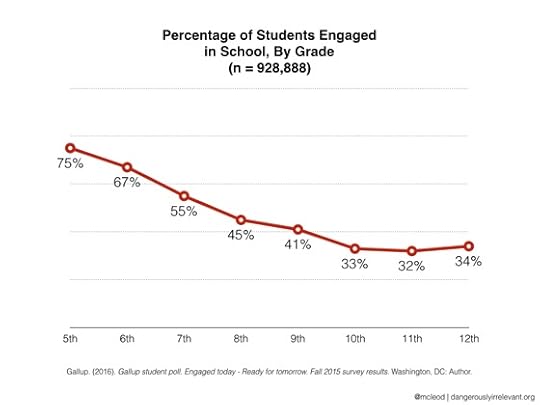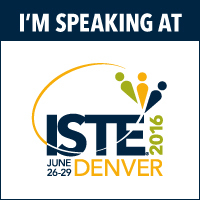Sylvia Libow Martinez's Blog, page 10
May 1, 2016
Bio is the new digital
“Bio is the new digital” – Nicholas Negroponte, MIT Media Lab founder
When Nicholas Negroponte predicts the future, youlisten (A 30 year history of the future). Now he says that biology is where digital was at the dawn of computers, and that synthetic biology and programmable organic materials are following the same pattern, with costs dropping and capabilitiesincreasing even faster than Moore’s Law.
Watch this amazing 10 minute video from Joi Ito, the current director of the MIT Media Lab.
P...
April 30, 2016
Amazing! Life, art, and making.
This was from a panel discussion at the Crossroads 2016 conference on the culture of making. Brooke Toczylowski drew the sceneand it’s amazing!
"To show you love someone make them something" LOVED YOU! #makeshop @smartinez @dror_yaron @dTechHS #InfyXRoads pic.twitter.com/SJFDQfjWC2
— Brooke Toczylowski (@BrookeTocz) April 28, 2016
Listening in to @smsantoso @smartinez @dtech @dror_yaron about #cultureofmaking #InfyXRoads pic.twitter.com/vNI5oMnBLA
— Vishal Sachdev (@vishalsachdev) April 28,...
April 25, 2016
If schools really cared about research, students would play chess
It bothers me when I hear about how any new initiative in schools has to be “research-based.” It’s often a code word for “go on a wild goose chase for some citations, and then we are going to say no anyway.”
If schools really wanted research-based practices that improve student learning, here’s a short list: recess, art, music, and chess. Let’s just talk about chess. It’s a fact that learning and playing chess gives kids skills and habits that help them succeed in school and in life. It’s bee...
March 31, 2016
Grand Challenges for Engineering
Grand Challenges for Engineering
On February 15, 2008, the National Academy of Engineering announced its list of 14 “grand challenges for engineering,” examples of the types of challenges confronting societies in the twenty-first cen- tury. The solutions to these challenges will all have large engineering components. Although engineers cannot solve these challenges alone, neither can the challenges be solved without engineers.
The fourteen grand challenges are:
Making solar power economical;...March 23, 2016
The biggest indictment of our schools is…
from Scott McLeod at Dangerously Irrelevant:
“The biggest indictment of our schools is not their failure to raise test scores above some politically-determined line of ‘proficiency.’ It’s that – day in and day out – they routinely ignore the fact that our children are bored, disengaged, and disempowered. We’ve known this forever, but we have yet to really care about it in a way that would drive substantive changes in practice.”


Scott created these charts from the most recentannual Gallup po...
March 21, 2016
No problem with Kohn
Dear Jennifer,
I read your post today called The Problem with Kohn after you tweeted a link to me. Thanks for the shoutout, and your flattering suggestion that I shouldhave been one of the people mentioned by Alfie Kohn in his recent Washington Post article on educational technology featured in Valerie Strauss’s column on education issues. I appreciate that you are sensitive to women being usurped by men as role models, spokespeople, and advocates.
However,I respectfully disagree withthe prem...
March 18, 2016
Reverse engineering for 3D printing – at any level
Here’s a quick thought experiment. Take a look at this article, “Reverse engineering for 3D Printing: Replicate, Replace & Improve Real Parts!” If you are using a 3D printer in a school, you may be on the lookout for practical articles that help explain how to tease the most learning out of your new cool technology. The article goes through five steps for taking aparta real world object to create a CAD design to make a 3D printed copy.
But I know for many teachers who don’t have an engineerin...
March 17, 2016
How to teach coding
Or how NOT to teach coding.
I get a lot of email asking me to look at various computer programming lesson plans and curriculum. “Is it good? Should I use this?” people ask. Some people want me to endorse something, “We’ve created something the kids will love! It’s so maker!”
So let me shareone secret, the very first thing I do when I click the link of whatever comes next in the email. I look at the first thing, the very first thing the kids are supposed to do. If lesson number one is bits, by...
March 3, 2016
The best professional development for teachers
It’s always good practice to offer professional development for K-12 teachers as part of any new program or initiative. “Making” in the classroom is no different. Hundreds of research studies offer guidelines and tips, yet it seems that many programs, even if they follow guidelines, do not adequately prepare teachers to change their actual practice in the classroom.
Some of these recommendations are daunting for providers of professional development. Good professional development should be:
...February 27, 2016
See you at ISTE 2016!

This June the International Society of Technology in Education is having a conference in Denver, CO. ISTE 2016 will have over ten thousand attendees, endless vendor exhibits and sessions about all aspects of educational technology.
Hope to see you there!
Make It, Wear It, Learn It[Lecture]
Monday, June 27, 2:30–3:30 pm MDT (Mountain Daylight Time) Building/Room: (specific location will be available in May)Girls & STEM: Making it Happen[Lecture]
Wednesday, June 29, 8:30–9:30 am MDT (Moun...


